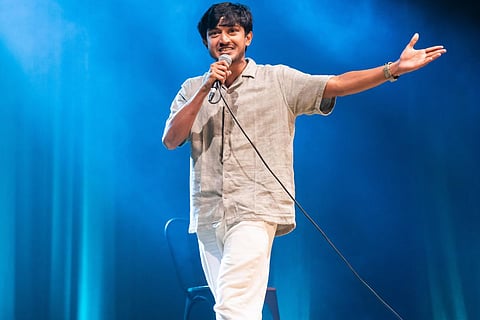Nirmal Pillai brings South Side Samurai to Chennai: A hilarious take on identity and growing up
Popular stand-up comedian Nirmal Pillai is all set to bring the house down this weekend in namma Chennai with his latest show, South Side Samurai. Nirmal, whose shows are usually a barrel of laughs, says this one too will cause gales of laughter to erupt from the audience. The show takes a deep dive into his life—growing up as a Malayali in Chennai, relocating to Bengaluru, and navigating the perpetual identity crisis that comes with straddling cultures. We caught up with the comedian to find out more.
Stand-up star Nirmal Pillai returns to Chennai with his solo show South Side Samurai
Tell us about your new show South Side Samurai. What can the audience expect?
It’s a solo show that’s very personal. I grew up with a constant identity crisis, being Malayali but growing up in Chennai, and then moving to Bengaluru later. The show revolves around that journey. There’s stuff about growing up, puberty... it's a bit random, to be honest! There’s rap, there’s a song—it’s not easy to label. But there is a solid narrative arc that ties it all together.
What would you say is the highlight of the show?
The end. There’s a bit where I want everyone in the audience to go home feeling proud to be an ex-puff. Sounds silly on the surface, but there’s genuine emotion and meaning behind it. It’s the kind of moment that sticks.
You’ve done a lot of shows with standup-comedian Abishek Kumar. What’s your equation like?
We actually met years ago, and I did a dosa rap for him the first time! He had about 5,000 followers back then, and I thought, “This guy could show me the ropes.” Nothing happened immediately, but we reconnected later. Both of us had grown, had our own audiences, and we realised we had a lot in common.
Now we’re real-life friends and we even live close to each other in Bengaluru. On stage, we have a rhythm. I know when to let him speak, he knows when to let me. It’s like being at a house party with your funniest friends, nobody trying to be the star, just having fun.
And now you’re doing a solo act. How different is that from your crowd work with Abishek?
It’s a completely different beast. With Abhishek, it’s improv and crowd work; we go on stage with no script, just a format. Everything else is spontaneous.
But South Side Samurai is fully written. Every joke, every pause, is rehearsed and refined. It’s based on material I’ve tested over two years. So yeah, a very different vibe.
What’s your writing or creative process like—especially when you work with someone else like Abishek?
Because we’ve done so many shows together, it’s almost instinctive now. We know each other's rhythm. I know when he’s building up to a punchline, and he knows when I am. And since we’re also genuine fans of each other’s work, there’s no ego.
That chemistry makes it feel natural. On stage, it’s like you're just hanging with friends—cracking each other up, and the audience joins in on the fun.
You’ve acted in a film too. Are there more movie projects in the pipeline?
Yes, I’m definitely planning something. I’d love to make a feature, and I’m working on it quietly. Tamil and Malayalam both. But for now, my focus is completely on the tour and South Side Samurai. Once that’s done, I’ll shift gears.
What’s the biggest challenge stand-up comedians face today, especially with people becoming more sensitive to content?
It’s not about live shows; those are usually safe. Your audience gets the joke; they know the context. The challenge starts when a clip goes online and reaches people who weren’t in the room.
They may not realise it’s a joke. They see a person on stage with a mic and assume you’re delivering some social or political message. But comedy is like music—it’s meant to entertain, not preach. Unfortunately, it’s easy to misunderstand stand-up when it’s taken out of context.
You've been doing stand-up for a while now. How has the scene changed since you started?
Honestly, I came in through a weird route—crowd work first, solo show later. That’s usually the other way around. But overall, stand-up has become more diverse.
There are so many voices now. Back then, you had a few dominant names. Now, it’s like a buffet—whatever your taste, there’s someone out there doing that kind of comedy. Especially in places like Mumbai and Bengaluru, the scene has really expanded.
What about OTT vs YouTube platforms?
In the first wave, it was all about getting on OTT. But now, creators want ownership. YouTube gives you that. You can control everything, what goes out, how it’s promoted, what clips you use. You don’t need a platform telling you what to cut. And it becomes part of your personal distribution channel. Comedians like Kenny Sebastian and Kanan Gill have embraced this. It’s the future, honestly.
Any upcoming projects you can share?
Apart from touring South Side Samurai, Abhishek and I are working on a new show together. We’re planning to take it international again. And like I said, there’s a film project brewing, but I don’t want to jinx it just yet.
Rs 499. July 28, 3 pm and 6 pm
At The Music Academy, TTK Road
sangeetha.p@newindianexpress.com
X-@psangeetha2112
For more updates, join/follow our
https://www.whatsapp.com/channel/0029Vb677uz60eBXiDYheb0n

